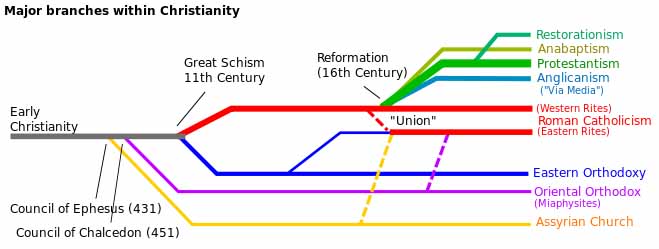As mentioned earlier, prior to coming back to
the Catholic Church, I’d been involved with other churches, including
Pentecostal, non-denominational, Methodist, Baptist and most recently,
Seventh Day Adventist. I’d also been to a Mormon church a few times
and had discussions with Jehovah’s witnesses. My experiences helped
me grow in my understanding of a variety of faith backgrounds, and in
many cases, in my relationship with Jesus. I’ve often experienced great
fellowship in these churches, churches filled with virtuous and
Christ-centered people. Indeed, some of the best experiences of my life
occurred as a result of being involved with protestant communitiess,
especially the Seventh-Day Adventist church. The friends I made in this
church, perhaps as a result of their commitment to keep the Sabbath
holy, i.e. spending devoted time with God and each other, turning away
from unnecessary work or spending money, so as to avoid inducing others
to work on a day of rest, will always have a place in my heart, in spite
of the church's traditionally strong anti-Catholic teachings.
Moreover, it was from the SDA church that I began to think more
critically about the importance of church doctrine. I also learned much
more about the amazing prophecies Christ fulfilled in establishing His
Church. Furthermore, in being a part of the SDA community for close to
three years, I was given a small glimpse of what it would be like to
live in a practicing Jewish family, being mindful of kosher foods and
keeping the Sabbath. I’ve truly been blessed by the many potlucks, book
clubs, rehearsals for plays and musical performances, singing at nursing
homes, health seminars, hiking, camping, fall festivals, movies and
dinners. If you'd like to read about one of our joyful experiences
together, please
click here.
Nonetheless, as much as I loved being a part of that community, I could
not accept some of the historical doctrines. Similarly, I couldn’t keep
"dating" the church; I needed to be a part of a community where I could
accept fundamental teachings and be committed, as a husband to his wife
and vice-versa.
As a Catholic, I’m no longer of the “Solo Scriptura” mindset. I don’t
believe the Bible is the only deposit of faith Jesus has given us.
Rather, Jesus established a Church, His bride, a society of followers
commissioned to govern with reason and in
accordance with the Holy Spirit.
Furthermore, the idea of a unified, or Catholic Church, is first found
in the letter of St. Ignatius to the Smyrnaeans, written about the year
110: 'Wherever the bishop appears, there let the people be; as wherever
Jesus Christ is, there is the universal [katholike] Church. It is not
lawful to baptize or give communion without the consent of the bishop.
On the other hand, whatever has his approval is pleasing to God. Thus,
whatever is done will be safe and valid.’
However, although the Catholic Church, by her nature, unifies and
orients followers towards proper worship, I’m aware of the challenges we
can each face when leaders, of any denomination for that matter, become
enticed by temptations, vice and worldly political aspirations, as all
of us are prone to do through our own concupiscence. The dreams of the
prophet Daniel warn us of what happens when selfish people take the helm
of organizations, making them into beasts that devour men, women and
children to preserve their power for the sake of their own dominance and
glorification.
In spite of how historical Seventh Day Adventist teachings portray the
Catholic Church in this way, views which may have been initiated by the
selfish actions of fallen men, I still recognize the authority of the
Catholic Church as our Mother and the Bride of Christ. Our universal
[katholike] Church has been responsible for passing on the deposit of
faith; the Bible alone is not complete in this deposit, as John himself
states,
“But there are also many other things that Jesus did; if every one of them were written down, I suppose that the world itself could not contain the books that would be written.” (John 21:25 NRSV)
More to it,
the Church plants each of us in fertile soil, soil that has been tilled
for nearly 2000 years so that the storms of secularism, relativism and
the doctrines proposed by those who see things differently and leave the
Church, potentially establishing their own church, don't blow us to and
fro, possibly uprooting us altogether. We see many of these storms, and
their result, in our world today.
Contrary to what most protestant churches teach, I believe the universal
Church is in communion with Saints, i.e. those who are known to have
lived extraordinarily holy lives and have had at least two miracles
ascribed to them, which has been verified by medical, or otherwise
appropriate experts. This communion means that the saint, when asked,
may intercede for someone in a supernatural way by virtue of their being
in the presence of God in heaven.
Carrying my knowledge of the Catholic Church a bit further, Jesus
fulfilled what we consider the Old Testament, or Old Covenant, when He
instituted the New Covenant, ending animal sacrifice. This covenant, or
shedding of blood, was fulfilled when Jesus spoke of and offered His
Blood as the blood of the New Covenant at the Last Supper, through the
cross. The Catholic Church rightly carries on the tradition of
consecrating bread and wine into His Body and Blood respectively,
forming the Eucharist, as discussed in John chapter 6, both separately and together.
Thus, the Eucharist is:
-
the fulfillment of Scripture as the fruit from the Tree of Life
-
bread from heaven, similar to the Mannah the Israelites ate for 40 years in the desert after thier miraculous delivery from Egypt while on their way to the Promised Land, bread which was also
-
preserved in the Ark of the Covenant, now represented by Mary, our Mother, and the Bride of Christ, His Chruch, who is also the New Eve, foretold in Genesis through the protoevangelium
-
the body and blood of Jesus, the lamb whose blood was placed on the front door of every Israelite home in order to save their firstborn child from death, now celebrated as the Passover, which coincided with the Last Supper, where Jesus Himself is the sacrificial lamb to be consumed, as well as the lamb represented by Isaac, who was going to be sacrificed on Mt. Moriah by Abraham, foreshadowing the true sacrifice of Jesus, God the Son, by God the Father, on the cross to settle the debt due our sin, which is death
-
infinite, the first and the last, the Father, Son and Holy Spirit... LOVE.
Are there really more than 8,196 protestant denominations?
Find out more at Catholic
Answers.
Website © 2013 LifeisSacred.net


